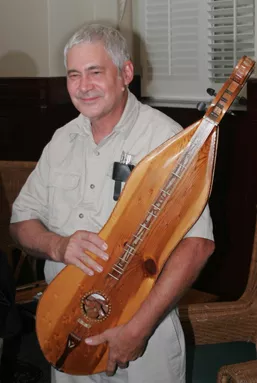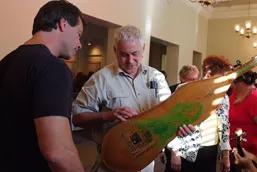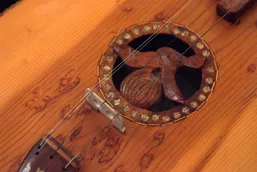At age five, Harold Wayne Turner picked up a banjo for the first time. Within a short period, he taught himself to pick out a rough approximation of “Cripple Creek.” This childhood experience began a lifelong love for music that eventually led him to become a respected luthier, a maker of stringed instruments, both in his local community of Pickens, South Carolina, and among the wider society of professional luthiers. The woodworking tradition in Turner’s family can be traced at least as far back as his grandfather, Wil Turner, who learned the art of making violins in the early 1900s. Harold Wayne’s father never mastered the art of making instruments, but he was an exceptional woodcarver. Turner supplemented the woodworking skills he picked up from his father with the expertise of his cousin, Freeman Patterson, who kept the instrument-making tradition alive in the family. A noted violin maker in the Carolina hills, Patterson passed on both technical skills and an emphasis on artistic creativity to Harold Wayne.
Combining the skills handed down from his father with the techniques gathered from his cousin, Harold Wayne became a talented luthier in his own right, making his first instrument in 1969. Though he prefers to make violins, Harold Wayne regularly creates dulcimers, or “hog fiddles,” as well as the occasional banjo, guitar, or bow fiddle. He is known for his creative use of recycled and natural materials, from old fence posts and coffee tables to mussel shells and grits for decoration. Turner’s artistic innovation reflects a childhood in the Pickens Mill Village where many learned to make what they needed or wanted from materials in the surrounding environment.
As a respected contributor to craft publications and a regular attendee of luthiers’ conventions, Turner shares his knowledge well beyond Pickens County. Those who know him well attest to Turner’s unassuming intelligence and irreverent wit as well as his strong, determined work ethic and his deep sense of family pride and tradition. For many years, Turner has contributed to the preservation and promotion of the art of instrument-making through programs at schools and demonstrations at historic sites, such as the Hagood Mill. Many in the community hope that his daughter, Sandy Foster, a talented journalist and emerging instrument-maker, will be the one to share her father’s exceptional knowledge of this tradition with future generations. Turner received the Jean Laney Harris Folk Heritage Award in 2010.




